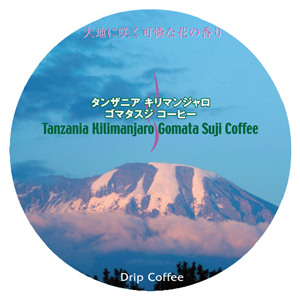I did not know that coffee was so delicious and good for us.A delightful cup of Andromeda Ethiopia Coffee I brew, first thing every morning permeates through me, and I become excited and vigorous, enjoying a sense of light spreading throughout my body. Enjoying an aroma of fruit, I am impressed by the complex flavor with a sweetness that comes with an awakening effect, a distinctive characteristic of coffee.
I am so fond of coffee that my day does not start without having a cup of coffee everyday. I had been searching for delicious coffee for a long time. In August 2000, I visited Ethiopia for the first time in my life. Its beginning was when I heard on the news that there were 10 million people whose lives were at stake from famine caused by drought.
After visiting the town of Gode, a place hit by drought, I went to a coffeehouse on the last night of my trip, and there, I experienced an Ethiopian coffee ceremony. Green coffee beans areroasted in a flat pan while enjoying a soothing aroma. In Ethiopia, it is said that the aroma of coffee is good for heart disease.The roasted beans are then ground and funneled into a coffeepot, where hot water gets poured in. The coffee poured into a small cup was refreshing and delicious. My body and mind were invigorated, being relieved of my fatigue from the trip at once. Instantly, I shouted, “How delicious! It is like medicine!” I was impressed by the encounter with the astonishing drink.
I was convinced when I heard that in Ethiopia, people had been consuming coffee as medicine since long time ago. I had not thought that coffee was good for my health. Hearing that coffee was a medicinal drink when I spontaneously said out loud that it tasted like one, I was happy with my new discovery, and from that time, I could fully enjoy drinking coffee. However, I had a hard time finding great coffee in Japan and other countries, and I continued in search of it. After many coincidences, we started to import Ethiopian coffee directly. I learned that Ethiopia was the original source of coffee. I feel honored to import coffee from the land of Ethiopia, the birthplace of human bei
ngs and the birthplace of coffee.

Wild coffee from forests of Ethiopia: a unique way of farming even amongst the world
Grown in natural forests without the use of agrochemicals, Ethiopian coffee is fresh, abounding with a medicinal effect that coffee used to have naturally. It has a fragrance of nature that is very invigorating.
Limu is produced in the Limu hills of Jimma, Kafa region. It is a wild coffee grown in the natural forests. In contrast to a plantation system which is common in the coffee farming industry, the flavor of wild coffee is largely affected by the environment indigenous to the land such as soil, water, air, and vegetation in the area.
4 types of production systems in Ethiopia
- Forest : Wild coffee trees (10% of total production)
Andromeda Ethiopia Coffee Limu is a forest coffee.
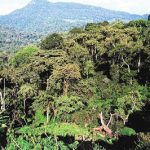
- Semi-forest : Weeds are slashed and soil is tended 2-3 times annually (35%)
Andromeda Ethiopia Coffee Yirgachafe is a semi-forest coffee.
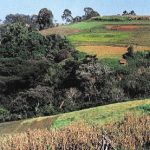
- Garden : Intercropped with other farm products (50%)
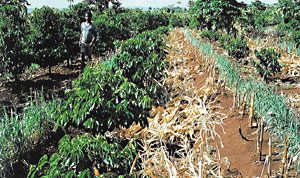
- Plantation : State-owned large-scale farms (5%)
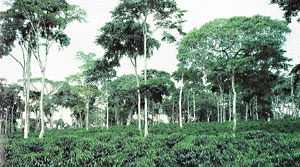
We received a report from the staffs of “Cukami,” representing Gomata area and other areas in Tanzania, that promotes the fair business of coffee.
“We hope you will have Gomata Suji Coffee that will support many farmers.”
Gomata Coffee is harvested in Suji Village located in the highlands of Kilimanjaro in the northern part of Tanzania. We “Cukami” promote a coffee industry that supports the farmers growing coffee on a small scale.
Introduction of Gomata
Gomata, Malindi, and Tae are all areas in Suji Village located in the highlands of Kilimanjaro. It is at GPS-47°09′25″N27°35′25″N. Located in the highlands of average 4333 feet above sea level, low temperature and year-round rain make the area suitable for coffee farming. Located 20km from Makanya city along the Arusha Road, the main road from Dar es Salaam, the rugged road to Gomata makes hiking to the village very challenging. The village is rather chilly, so we hope you warm up first by having a cup of hot coffee upon arrival.


The history of Gomata Suji Coffee
In Gomata, we cultivate an Arabica coffee. The characteristic in the area is that each farmer grows coffee on a small scale (about 1-2 acres), and many of them have a history of growing coffee for more than 50 years, meaning owners of the farms who are now 60 to 80 years-old started the farms when they were young. It is said that “the secret to successful farming is to cultivate coffee with the generosity of the African people.” The farmers indeed worked on coffee farming with such attitude and continued to grow coffee, never giving up, even at the time of plight of the coffee industry that lasted for the past 15 years. Consuming Gomata Suji Coffee will support the farmers’ livelihoods and help their children.
The pride of the Gomata farmers who live in harmony with nature is that they cultivate based on the natural cycle. Most of the farmers, though there is an economic reason as well, pride themselves as nature’s people and do not use chemicals and insecticides.Instead of chemical fertilizers, they use natural fertilizers such as compost and manure. Together with us, they also started pest and disease control using a traditional method of Kilimanjaro. Also, they planted banana trees in between the coffee fields to create shade and to use their fallen leaves as natural fertilizers. The farmers of Gomata are using various methods that do not go against the cycle of nature to supply high-quality Gomata coffee to their customers.
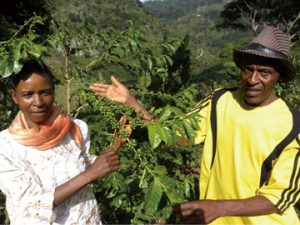
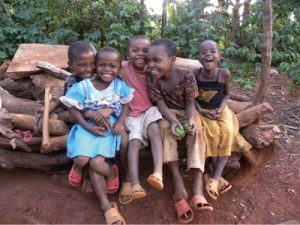
The history of Tanzanian coffee
Cultivation of coffee in Tanzania dates back to the era of colonial rule. After independence in 1961, it became one of the world’s leading countries of coffee export. The rainy weather all year round in Mbeya and Ruvuma regions in the highlands of southern Tanzania are suitable for coffee farming. The highlands in the north where Gomata coffee is harvested is known to produce coffee of the highest grade in the country. Its circular geography originated from volcanoes. The area includes the Usambara Mountains, the Pare Mountains, Mount Kilimanjaro, Mount Meru, Ol Doinyo Lengai, a volcanic caldera of Ngorongoro Crater. Gomata area is in the Pare Mountains in the Kilimanjaro region. Blessed with plenty of rain, highlands with low temperature, and volcanic soil, Gomata Suji Coffee is cultivated preserving the traditional method and is highly valued by the people in the world who love coffee.
The Tanzanian government has been taking various measures for the improvement of the farmers’ livelihoods and solution to the problem of poverty. In the Kilimanjaro region, Kilimanjaro Native Cooperative Union (KNCU), the oldest cooperative in Africa founded by Charles Dundas in 1930, played a central role in developing the market and advising farmers on business management. The cooperative is constituted from 90 primary cooperative societies that are involved in the coffee industry in Kilimanjaro. It went through a development stage during 1950s-60s and was nationalized in 1977. But after back to privatization in 1984, it started to take its own path as an independent organization. Coffee in the Gomata area is under the jurisdiction of Basunu cooperative, one of the KNCU members.
Liberalization of the economy brought about major changes. In 1986, World Bank, IMF, and the Tanzanian government agreed to the Structural Reform Plan (SAP), which encouraged revitalization of export industries and drastic reduction of central government’s fiscal expenditure. Although it seemed to be a necessary policy from the macroeconomic point of view, income decreased due to more production and price became lower; expenditure such as medical expenses grew; and the policy of sharing educational knowledge became a burden for the farmers. As a result, the policy impoverished the farmers further. In the early 1990s, the movement of direct purchase of the coffees by domestic and overseas companies flourished, which caused the cooperatives to decline. KNCU lost 80% share in just 4 years, and many problems arose for the perplexed Gomata farmers. Due to liberalization, the farmers could no longer set the prices themselves, causing the price of coffee to slump in a decade. Annual harvest for a farmer was about 50 bags (2,500 kgs) on average, however, this plummeted to about 6-10 bags. In addition, support from the government was lacking, so opportunities to invest in coffee farming diminished, interest of young people entering the industry faded, and the supply of coffee declined. Previously, there was a mechanism where SAP provided various necessities for production to secure crop, but now farmers cover all necessary expenses themselves while the price of coffee is controlled externally. There is a contradiction in the mechanism. The new system that started for the self-support of the farmers worsened their livelihoods. Production cost rose rapidly, but income declined. Without any outside support, harvest is only possible on the scale of the farmer’s ability. Not only the individual farmers but the structure of the entire coffee industry was weakened. When we visited the farms, one of the waterworks required for the drying process after harvesting was out of order without repair due to lack of any support. Therefore, consuming more Gomata coffee will support the coffee farmers.
Matured with Idaki Shin Sound
We play Idaki Shin sound at the time of roasting
To make even better what is already delicious fruit of nature that is good for us, we play Idaki Shin sound at the time of roasting, when coffee beans emit carbon and the energy of the sound is the most absorbed, using a specially made sound system developed by NPO KOMA.
The Idaki Shin sound is full of the energy of light that embraces the universe. Just by listening to it, the original strength of one’s life is born, and one is filled with dynamic energy. One feels refreshed and relaxed and becomes filled with the energy of love.
I know with my own life that the sound is one with lives in nature. With the sound resonating within one’s body and internality, one becomes filled with strength and vigor from within. We installed at the coffee roasting factory, a specially made sound system developed to play directly the quality of the Idaki Shin sound that enriches people’s internalities.
Andromeda Ethiopia Coffee that absorbed the energy of the Idaki Shin sound is abounding with the energy of 100% light, making one feel warm, become awakened, and invigorated just by drinking it.
The power of the wild coffee beans, filled with energy and blessings from woodlands, and the energy of the Idaki Shin sound became one, and Andromeda Ethiopia Coffee, exquisite and energetic, was born.
I am always thankful to be filled with strength when drinking Ethiopian coffee, the fruit of nature that is grown without disrupting the natural environment. For 26 years, I have lived according to natural law similar to how ancient people lived, and I was able to live without taking medicine even when I was feeling ill. I become rejuvenated by nicely brewing and drinking a cup of Andromeda Ethiopia Coffee. Enjoying it every day, I am grateful that a good product brings about only good effects.



